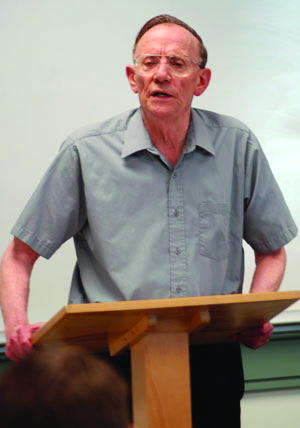Psychology professor Charles L. Brewer, one of Furman’s most senior faculty members, recently announced that he will be retiring at the end of the spring semester after more than 45 years at the university. Brewer joined Furman’s faculty in 1967 and became a professor in 1970.
Furman originally hired Brewer to redirect the university’s psychology program, and Brewer changed the curriculum to focus the department on a scientific approach dedicated to sustaining and publishing research.
Psychology Department Chair Gil Einstein credits Brewer with building psychology into a respectable major at Furman, saying that Brewer “sets high standards for being a great teacher” and “added rigor and breadth” to the major.
Brewer is a nationally-recognized expert in the field of psychology, and his faculty biography comments that he has received “more national awards by himself than most entire faculties receive in a century.” The Princeton Review recently recognized Brewer as one of “The Best 300 Professors” in the United States, and the American Psychological Association named its lifetime teaching award after him — the Charles L. Brewer Distinguished Teaching of Psychology Award.

Photo courtesy of Furman University
In addition to his many awards and recognitions, Brewer is highly regarded among students and colleagues alike. Einstein said that he considered Brewer his own teaching mentor and would meet with him everyday for 30 minutes during his first few years as a professor.
“I could never teach like him,” Einstein said, adding that his advice, wisdom, and constant willingness to help students and colleagues made him a “teaching treasure.”
Clark Dixon, a junior neuroscience major, described Brewer as “the hardest professor at this school” but also one of the most influential.
“My courses are considered to be very demanding,” Brewer acknowledged, while adding that his courses are “not hard for the sake of being hard.”
Brewer said he has high expectations but emphasized that students reap the rewards of their hard work.
“The most rewarding thing is that my students get the highest reward,” he said.
Though Brewer pushes his students, he is not afraid to have fun in the classroom. His classes are interactive and his methods famous around Furman.
On the first day of every class, Brewer attempts to explain infinity to his students by tracing a marker around the classroom, out the door, around the hall, and back into the classroom, before finally throwing the marker out the window and exclaiming, “That is infinity!”
“It is an honor to take a class with a professor like that,” Dixon said.
During his tenure at Furman, Brewer has witnessed the university’s faculty progress from a rarely published body to one in which every professor is expected be published within their field. The change is partly thanks to changes within the psychology department.
Brewer said he has seen Furman produce “very, very capable” students with a strong desire to succeed, watching more than 200 students go on to receive doctoral degrees.
Though Brewer’s sense of humor and strong commitment to learning will be missed in the classroom, students and professors can expect to continue to see him around campus. Brewer will keep his office in the psychology department to continue research and will be a consulting editor for the American Psychology Association’s new journal, “Scholarship of Teaching and Learning in Psychology.”
“I will still be a psychologist, just not a teacher,” Brewer said, adding that he has high hopes for the future of the psychology department.
Brewer said he plans to read regularly in retirement and that he’s already lined up a biography of Mahatma Gandhi.
Students and professors made clear that Charles Brewer’s classes will be missed, though they used his retirement to reflect on Furman’s growth as an institution with a well-respected psychology department. At the same time that Brewer influenced this growth, he impacted hundreds of students and faculty in the process.
“We’re losing a legend,” Dixon said.
